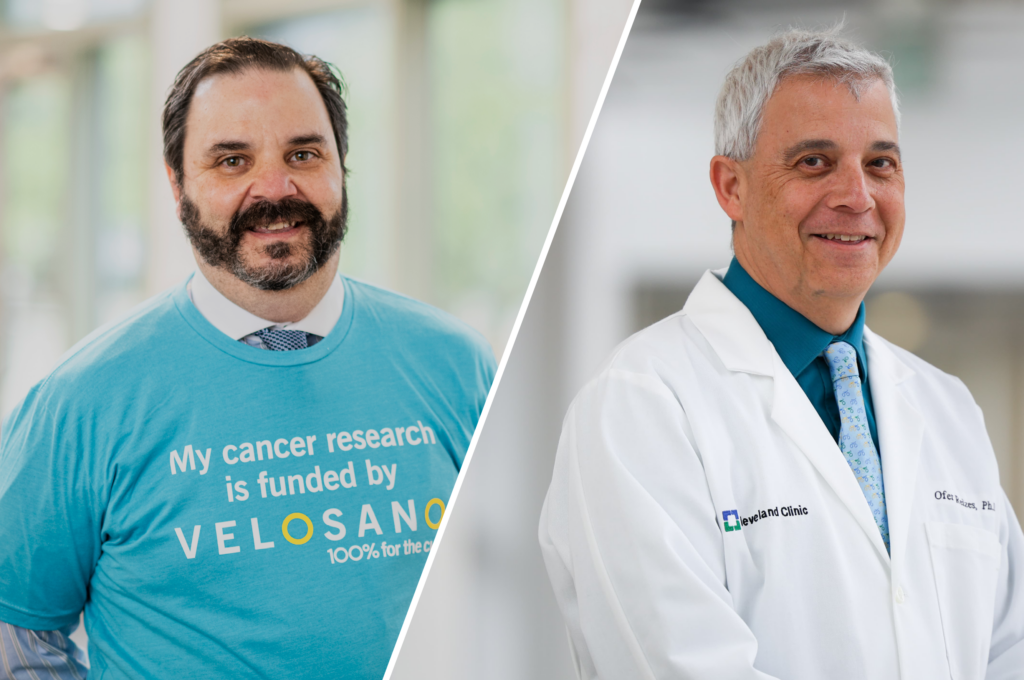
Batman and Robin, Simon and Garfunkel, Abbott and Costello—it’s been said before that two heads are better than one. When it comes to cancer research, one dynamic duo is moving the needle towards a world without ovarian cancer through a unique partnership.
Robert DeBernardo, MD, is the section head of gynecologic oncology at Cleveland Clinic. He holds the Laura J. Fogarty Endowed Chair in Uterine Cancer Research in the Women’s Health Institute and is the director of the peritoneal surface malignancy program.
Ofer Reizes, PhD, is a staff researcher at the Department of Cardiovascular Metabolic Sciences at the Lerner Research Institute and holds the Laura J. Fogarty Endowed Chair in the Lerner Research Institute.
For the past seven years, Drs. DeBernardo and Reizes have been looking into the mechanisms behind HIPEC (Hyperthermic Intraperitoneal Chemotherapy), which involves a heated chemotherapy solution that has been shown to improve survival rates in women with ovarian cancer.
Their collaborative research has earned them multiple grants from VeloSano, including the most recent round of 2022 Pilot Grants. VeloSano Pilot Grants provide seed funding for high-risk, high-reward cancer research activities that can quickly advance the development of revolutionary cancer treatments.
Flipping the Paradigm
“What’s unique about our research is that we’re close to our clinical colleagues,” said Dr. Reizes. “I’m a researcher, and my colleague Dr. Debernardo is in the clinic taking care of the patients. Our goal is to create new approaches to improve patient lives. That’s possible here at the clinic because we’re so close; I mean, we’re literally a hundred yards away.”
“You kind of have to think in a big picture way with big global ideas and then test them,” said Dr. DeBernardo. “Instead of moving from bench to bedside, we’ve flipped this whole paradigm on its head. We had some data from clinical work that a particular way of treating somebody with ovarian cancer has a benefit, but we don’t know exactly why it’s working, and so we’re going from bedside to bench to find the answers.”
Their work has produced promising results and has attracted both funding from the National Institutes of Health (NIH) and inclusion in an upcoming national clinical trial.
Looking to the future, Drs. DeBernardo and Reizes are specifically looking at how HIPEC works with a patient’s own immune system. By taking individual cells and seeing how those cells behave after HIPEC treatment they are uncovering new ways to target cancer treatment. Their hope is that not only will they find better ways to treat ovarian cancer, but that their findings will translate to treatments for other cancers down the road.
Because HIPEC is such a specialized procedure, the use of HIPEC is currently limited to large academic centers like Cleveland Clinic and is not widely available to every hospital in the country. Drs. Reizes and DeBernardo are working to find solutions to overcome that limitation so that more cancer patients can have access to this life-extending treatment.
Their back-and-forth exchange—bedside to bench, and back to bedside—is helping the team identify new directions, new chemotherapies, and ways to not only improve upon HIPEC, but also to create new drugs that can be used without the HIPEC strategy.
None of which, they admit, would have been possible without the seed funding from VeloSano.
VeloSano: “Swift Cure”
Latin for “swift cure”, VeloSano has become the link connecting philanthropy to research, research to patients, and patients to cures. Since its inception in 2014, more than $37 million has been raised by VeloSano participants and has advanced over 200 cancer research projects. VeloSano works to connect the cancer community with Cleveland Clinic’s expanding global impact in research, innovation and care. This unique partnership ensures an accelerated path to finding cures by making good on the promise that one hundred percent of every dollar raised for VeloSano initiatives will support transformative, lifesaving cancer research happening at Cleveland Clinic today, in order to impact the lives of millions of people around the world, tomorrow.
“VeloSano funding for HIPEC has allowed our team to grow, to ask different questions that haven’t been asked before. We’ve approached a very clinical directed set of questions. We’ve also managed to obtain funding from the NIH to support these types of initiatives, which accelerates our efforts to get back into the clinic,” said Dr. Reizes. “Our work starts with the patients. We took patient tumors and studied patient tumors and now are moving it into cell studies, and then the goal is to move it back into the patient. We want to have an impact on the way patients are treated ultimately improve their survival. That’s what we’re really excited about.”
Dr. Reizes is not only a researcher, but he is also a 10-year VeloSano Bike to Cure rider. Dr. DeBernardo has also participated in VeloSano Bike to Cure weekend for the past two years.
“VeloSano is more than just a fundraising opportunity; it’s supporting a mission and a vision of bringing an end to cancer, and that is why I participated for 10 years in a row,” said Dr. Reizes. “Our vision is to change the way patients are treated, and it’s to end cancer as we know it. It’s a movement; it’s not just Cleveland Clinic. It’s a whole community that is fighting to change the lives of cancer patients.”
Learn more about VeloSano and the annual flagship fundraising event, Bike to Cure, taking place in Cleveland September 8-9.
